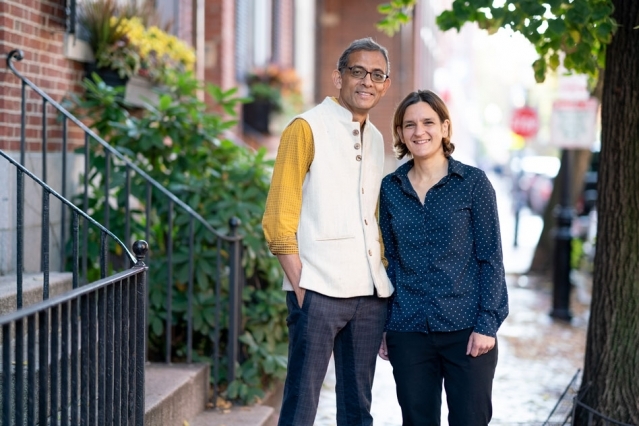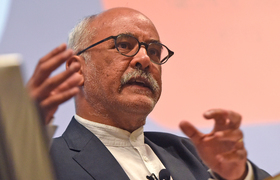UCT’s role in Nobel win
05 November 2019 | Story Niémah Davids. Photo Supplied. Read time 4 min.
Professors Abhijit Banerjee and Esther Duflo, co-founders of the Abdul Latif Jameel Poverty Action Lab (J-PAL), the international counterpart to J-PAL Africa at the University of Cape Town (UCT), were recently named as two of the three recipients of the 2019 Nobel Prize in Economic Sciences.
The award recognises the power of economics as viewed through an unusual lens, and the meaningful impact the field can have on poverty alleviation around the world.
Michael Kremer, an American development economist and the Gates Professor of Developing Societies at Harvard University, and a long-time J-PAL affiliate, was their co-recipient.
Banerjee and Duflo, who both work at the Massachusetts Institute of Technology (MIT) in the United States, founded J-PAL in 2003 in a bid to reduce poverty around the globe by ensuring policies and practices are informed by scientific evidence.
From just six staff members more than a decade ago, the centre is now home to 181 affiliated researchers and 400 staff at leading research universities around the world. J-PAL Africa is housed in the Southern Africa Labour and Development Research Unit (SALDRU) in UCT’s School of Economics.
The Nobel statement read: “The research conducted by this year’s laureates has considerably improved our ability to fight global poverty. In just two decades, their new experiment-based approach has transformed development economics, which is now a flourishing field of research.”
“What we’re doing is working”
At the heart of J-PAL’s work is the crafting of development policy using randomised evaluations; the impact evaluation method developed and popularised by the laureates in the field of development economics over the past 20 years.
The method tests precise, often small questions about what does and does not work when it comes to impacting the lives of the poor. The approach challenges researchers and policymakers to understand the world’s most marginalised, and how and why they respond to policies and programmes the way they do.
“We are celebrating the recognition of the importance and urgency of our work. We hope it inspires and propels more researchers and policymakers in the region to reiterate on policy and design in this careful and effective way.”
Laura Poswell, executive director for J-PAL Africa, said the accolade stretches beyond the three recipients. It was a “wonderful recognition” for a movement of researchers and policymakers from around the world, including in sub-Saharan Africa, who are using these methods to carefully design policy.
“We are excited, thrilled and truly honoured to feel a part of this Nobel Prize. We are celebrating the recognition of the importance and urgency of our work. We hope it inspires and propels more researchers and policymakers in the region to iterate on policy design in this careful and effective way,” she said.
Diversity is crucial
The need to diversify the sector is crucial, Poswell stressed.
“Esther is only the second woman to receive this accolade and that has focused attention on the issue of diversity in the field of economics.”
Not nearly enough women are represented in this field, she said, adding that this year’s award could help to change that. It should inspire other young women to come on board too.
“This prize showcases that economics work can be so much more interesting than just finance and banking,” she said.
“We work every day teasing out questions about education, health and labour markets. If people begin to see what interesting and exciting work this can be, it will be one helpful way to attract those with more diverse interests into the profession.”
 This work is licensed under a Creative Commons Attribution-NoDerivatives 4.0 International License.
This work is licensed under a Creative Commons Attribution-NoDerivatives 4.0 International License.
Please view the republishing articles page for more information.










